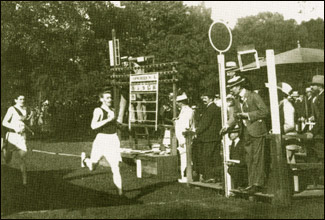| Athletics at the Games of the II Olympiad | |
|---|---|
 Host stadium (shown in 2017) | |
| Venue | Croix-Catelan Stadium |
| Dates | 14–22 July 1900 |
| No. of events | 23 (23 men, 0 women) |
| Competitors | 117 from 16 nations |
| Athletics at the 1900 Summer Olympics | |
|---|---|
| | |
| Track events | |
| 60 m | men |
| 100 m | men |
| 200 m | men |
| 400 m | men |
| 800 m | men |
| 1500 m | men |
| 110 m hurdles | men |
| 200 m hurdles | men |
| 400 m hurdles | men |
| 2500 m steeplechase | men |
| 4000 m steeplechase | men |
| 5000 m team race | men |
| Road events | |
| Marathon | men |
| Field events | |
| Long jump | men |
| Triple jump | men |
| High jump | men |
| Pole vault | men |
| Standing long jump | men |
| Standing triple jump | men |
| Standing high jump | men |
| Shot put | men |
| Discus throw | men |
| Hammer throw | men |
At the 1900 Summer Olympics, twenty-three athletics events were contested. Altogether, 117 athletes from 15 nations competed. A total of 68 medals (23 gold, 23 silver, 22 bronze) were awarded. The 23 events listed are those currently considered to have been of Olympic stature by the International Olympic Committee and most Olympic historians. They exclude all events that used a handicap system, as well as all events which were open to professional athletes. The IOC has never decided which events were "Olympic" and which were not. [1]
Contents
- Medal summary
- Daily summary
- 14 July
- 15 July
- 16 July
- 19 July
- 22 July
- Participating nations
- Notes
- References
- References 2
Competitions were held on 14 July, 15 July, 16 July, 19 July, and 22 July. This included Bastille Day, which is a French holiday, and then Sunday, which many of the American athletes protested. Even with many Americans not competing in finals because of confusion caused by the organizers' decision to count scores achieved on Monday, 16 July for finals held on Sunday, 15 July and subsequent rescission of that decision, the United States won more than 4 times as many medals as any other nation, including 16 of the 23 gold medals.
The conditions of competition were also subpar compared even to those at the previous games in 1896. There was no track for the Paris Games, as a grass field dotted with trees and of unequal elevation was used. The course was 500 metres in length, an unusual distance for a track.
